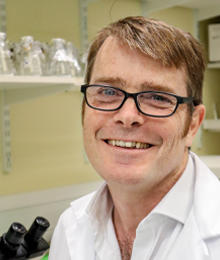An interview with Professor Robin Williams
May 2020
Robin Williams is a Professor of Molecular Cell Biology in the Centre of Biomedical Sciences at Royal Holloway University in London. He is a member of the Microbiology Society, and in this interview, he tells us more about his research, which involves investigating how drugs and natural medicines function a molecular and cellular level.

Tell us about your current research.
Our lab employs a microbial model to investigate how drugs and natural medicines function at a molecular and cellular level. Using the microbial model allows us to do a range of experimental techniques that are not possible in standard biomedical models (such as mice and rats), allowing us to make significant research advances. These advances allow us to better understand how drugs treat diseases or conditions, and to identify more potent or safer drugs. We then often translate these advances to animal or human models, to validate the newly identified or validated mechanism, drug target or new and improved drug. We expect our research will ultimately improve human health and societal wellbeing.
Why does this research matter?
Cannabidiol or CBD is the most well-known of the non-psychotropic cannabinoids, derived from the cannabis plant. It is of huge medical interest, as it is used in the treatment of epilepsy and multiple sclerosis and may be effective in the treatment of psychosis. Our understanding of how CBD functions at a molecular and cellular level remains limited.

Use of our microbial model has enabled new insights into CBD and other cannabinoids. We have evidence that some cannabinoids may be more potent that others, providing new areas for drug development. We have also recently defined a novel molecular mechanism for how CBD blocks seizure activity, by initially identifying the mechanism in our microbial model, and from this discovery, we have been able to demonstrate the mechanism in both mammalian neurons during seizure activity, and in rodents with a form of genetically inherited epilepsy.
We expect that these discoveries will change the focus of research on this mechanism, may provide better clinical insights into what causes epilepsy, and will enable the development of new treatments that exhibit this effect with improved safety or potency.
What qualifications did you obtain before starting your current role?
I completed a Bachelor of Science (BSc) degree with honours in Biochemistry, and then a PhD in the field of Molecular Cell Biology. I was fortunate to be able to undertake two postdoctoral appointments (at St Andrews University and University College London [UCL]), prior to a Wellcome Trust Career Development Fellowship (at UCL). I then was appointed Senior Lecturer at Royal Holloway University of London, where I am now a Professor of Molecular Cell Biology.
What are the professional challenges that present themselves and how do you try to overcome them?
The excitement of research discovery is hard to overestimate and gets me out of bed at 6am every day. This excitement helps to overcome the challenges – best defined by the multiple roles that an academic must be successful in (teaching undergraduate students, overseeing research, keeping up with world-wide research advances, writing papers, writing grants, managing budgets and accountancy, managing staff and postgraduate students, coordinating collaborations, and outreach to the wider society). But the single hardest aspect of the job is the time and effort to apply for funds to continue research, which are mostly rejected; and for publishing papers in important journals. These are best overcome by keeping positive, focusing on the wonderful students that carry out such excellent research, and the amazing research breakthroughs that our work has provided!
What is a typical working day for you?
I normally start work at 7:45 in the office, answering emails. The standard day would include four hours spent writing (grant applications, research papers, emails and general administration); fitting around eight short one-to-one research meetings. I spend 90 minutes marking and an hour teaching (lectures, tutorials, practicals, dissertation and projects). These activities are interspersed with me wandering around the laboratory, to disengage from my computer and talk to my colleagues and research group, regarding research and teaching.
Tell us about your biggest professional achievement(s) so far
The outcome of our research that I am most pleased with is related to our epilepsy research. There are an estimated 50 million people worldwide with a diagnosis of epilepsy. In about 30% of patients, the best treatments do not stop seizures, leaving these individuals with an unmet need for improved medicines. Our research has been effective in these areas.
Using our microbial model, we have been fortunate enough to identify a range of compounds that block seizures, which we have confirmed in well-accepted (animal) epilepsy models, in collaboration with our wonderful clinical colleagues. From these studies, we have identified one compound, that is provided in a diet to treat patients with drug-resistant epilepsy, and we have shown that it is this compound that blocks seizures. This has enabled us to help develop a new dietary treatment for those patients with drug resistant epilepsy, which has just finished testing in clinical trials. Thus, we have successfully progressed our research from a simple microbial model, to help patients with drug-resistant epilepsy.
Where did your interest in microbiology come from?
I’ve always been interested in how cells work, for example how cells function in normal day-to-day activities or change in disease states, and how we can reverse these disease changes. Although it's necessary to show these changes in human (or mammalian) cells, it is hard to discover how these changes occur in human cells. That’s why I became so interested in microbial models, as we can do research to identify how cells function, what changes in disease states and how medicines can reverse disease-related changes!
Why does microbiology matter?
Microbiology is focused on understanding the enormous world of micro-organisms. These organisms are so important for our everyday lives, from the cheese we eat and the beer we drink, to our enormously important gut microbial community; to the many pathogenic microbes that we spend so much time trying to avoid or treat. Through microbiology research, we can enhance our lives in so many ways, to provide food, to maintain our health and treat our diseases. Long live microbiology!


